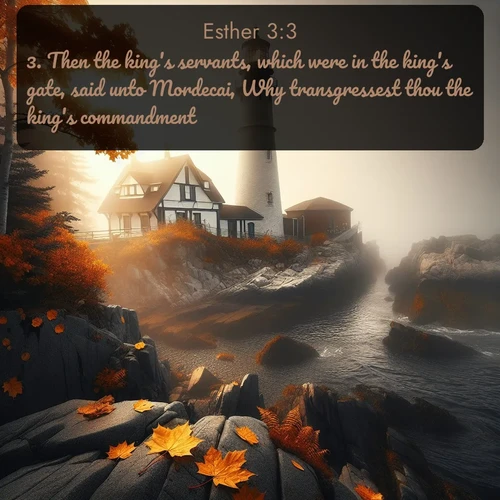Esther 3:3 plusieurs versions / traductions
English Bible Translations
3. Then the king's servants, which were in the king's gate, said unto Mordecai, Why transgressest thou the king's commandment?
3. Then the king's servants, that were in the king's gate, said unto Mordecai, Why transgressest thou the king's commandment?
3. Then the king's servants who were in the king's house said to Mordecai, Why do you go against the king's order?
3. Then the king's servants, who were in the king's gate, said to Mordecai, Why transgressest thou the king's commandment?
3. Then the king's servants who were in the king's gate, said to Mordecai, Why dost thou transgress the king's commandment?
3. And the servants of the king, who [are] in the gate of the king, say to Mordecai, `Wherefore [art] thou transgressing the command of the king?'
German Bible Translations
3. Da sprachen des Königs Knechte, die im Tor des Königs waren, zu Mardochai: Warum übertrittst du des Königs Gebot?
3. Da sprachen die Knechte des Königs, die im Königstore waren, zu Mardochai: Warum übertrittst du des Königs Gebot?
French Bible Translations
3. Les serviteurs du roi qui se tenaient à la porte du roi lui dirent: «Pourquoi enfreins-tu l'ordre du roi?»
3. Et les serviteurs du roi, qui se tenaient à la porte du roi, dirent à Mardochée: Pourquoi transgresses-tu l’ordre du roi?
3. Et les serviteurs du roi, qui se tenaient à la porte du roi, dirent à Mardochée: Pourquoi transgresses-tu l'ordre du roi?
3. Alors les serviteurs du roi qui étaient à la porte du roi dirent à Mardochée: Pourquoi transgresses-tu le commandement du roi?
3. Et les serviteurs du Roi qui étaient à la porte du Roi, disaient à Mardochée : Pourquoi violes-tu le commandement du Roi?
3. Et les serviteurs du roi, qui étaient à la porte du roi, dirent à Mardochée: Pourquoi violes-tu le commandement du roi?
Versions with Strong Codes
Esther 3 / KJV_Strong3. Then the king's[H4428] servants,[H5650] which[H834] were in the king's[H4428] gate,[H8179] said[H559] unto Mordecai,[H4782] Why[H4069] transgressest[H5674] thou[H859] [H853] the king's[H4428] commandment?[H4687]
Strong Code definitions
H4428 melek meh'-lek from H4427; a king:--king, royal. see H4427
H5650 `ebed eh'-bed from H5647; a servant:--X bondage, bondman, (bond-)servant, (man-)servant.see H5647
H834 'aher ash-er' a primitive relative pronoun (of every gender and number); who, which, what, that; also (as an adverb and a conjunction) when, where, how, because, in order that, etc.:--X after, X alike, as (soon as), because, X every, for, + forasmuch, + from whence, + how(-soever), X if, (so) that ((thing) which, wherein), X though, + until, + whatsoever, when, where(+ -as, -in, -of, -on, -soever, -with), which, whilst, + whither(- soever), who(-m, -soever, -se). As it isindeclinable, it is often accompanied by the personal pronoun expletively, used to show the connection.
H4428 melek meh'-lek from H4427; a king:--king, royal. see H4427
H8179 sha`ar shah'-ar from H8176 in its original sense; an opening, i.e. door or gate:--city, door, gate, port (X -er).see H8176
H559 'amar aw-mar' a primitive root; to say (used with greatlatitude):--answer, appoint, avouch, bid, boast self, call, certify, challenge, charge, + (at the, give) command(-ment), commune, consider, declare, demand, X desire, determine, X expressly, X indeed, X intend, name, X plainly, promise, publish, report, require, say, speak (against, of), X still, X suppose, talk, tell, term, X that is, X think, use (speech), utter, X verily, X yet.
H4782 Mordkay mor-dek-ah'-ee of foreign derivation; Mordecai, an Israelite:--Mordecai.
H4069 madduwa` mad-doo'-ah or madduaa {mad-doo'-ah}; from H4100 and the passive participle of H3045; what (is) known?; i.e. (by implication) (adverbially) why?:--how, wherefore, why.see H4100 see H3045
H5674 `abar aw-bar' a primitive root; to cross over; used very widely of any transition (literal or figurative; transitive, intransitive, intensive, causative); specifically, to cover (in copulation):--alienate, alter, X at all, beyond, bring (over,through), carry over, (over-)come (on, over), conduct (over), convey over, current, deliver, do away, enter, escape, fail, gender, get over, (make) go (away, beyond, by, forth, his way, in, on, over, through), have away (more), lay, meddle, overrun, make partition, (cause to, give, make to, over) pass(-age, along, away, beyond, by, -enger, on, out, over, through), (cause to, make) + proclaim(-amation), perish, provoke to anger, put away, rage, + raiser of taxes, remove, send over, set apart, + shave, cause to (make) sound, X speedily, X sweet smelling, take (away), (make to) transgress(-or), translate, turn away, (way-)faring man, be wrath.
H859 'attah at-taw' or (shortened); aatta {at-taw'}; or wath {ath}; feminine (irregular) sometimes nattiy {at-tee'}; plural masculine attem{at- tem'}; feminine atten {at-ten'}; or oattenah{at-tay'naw}; or fattennah {at-tane'-naw}; a primitive pronoun of the second person; thou and thee, or (plural) ye andyou:--thee, thou, ye, you.
H853 'eth ayth apparent contracted from H226 in the demonstrative sense of entity; properly, self (but generally used to point out more definitely the object of a verb or preposition, even or namely):--(as such unrepresented in English). see H226
H4428 melek meh'-lek from H4427; a king:--king, royal. see H4427
H4687 mitsvah mits-vaw' from H6680; a command, whether human or divine (collectively, the Law):--(which was) commanded(-ment), law, ordinance, precept.
Prédications qui analysent les thèmes Esther 3
Thèmes : Le complot contre les Juifs; Le décret de destructionRelated Sermons discussing Esther 3
Themes : Le complot contre les Juifs; Le décret de destructionsee also: Bible Key Verses ; KJV Bible Images, BBE Bible images

